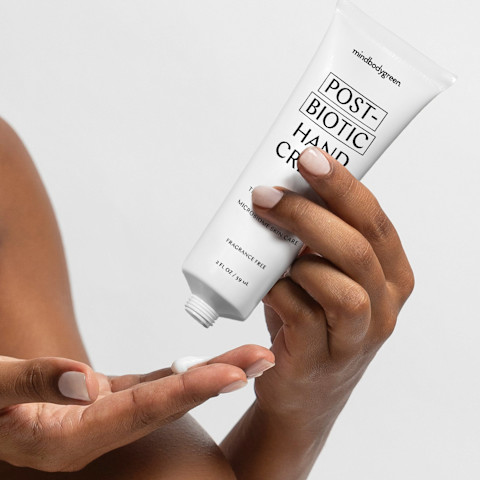If Your Hands Are Aging Faster Than The Rest Of Your Skin, You Might Be Making These Mistakes

I'm not the first beauty writer to give this advice (and I certainly won't be the last), but the skin of the hands often ages faster than the rest of the body.
So if you've noticed the back of your hands developing dark spots, wrinkles, thinning skin, or dryness, just know it's not uncommon. That's the bad news.
The good news is that this concern is entirely avoidable (if you've yet to see these signs of premature aging) and treatable (if you have).
Here, the biggest mistakes that might be causing your hands to look older than they should be. And for good measure, what dermatologists and skin care experts say about treatments.
Mistake 1: Forgetting sunscreen
Folks are always looking for magical do-it-all products that can solve just about any skin issue. Well, we've had it this whole time: sunscreen.
Sunscreen can shield your skin from inflammation, dryness, premature aging, and all the myriad issues that come with prolonged, unprotected UV exposure.
"The DNA in skin cells gets damaged when the skin is unprotected and exposed to UVA and UVB radiation from the sun," explains Jodi LoGerfo, DNP, who is a doctor of nursing practice and a family nurse practitioner certified in family medicine and dermatology.
And while there's certainly more awareness about the benefits of wearing sunscreen daily, most folks only apply it on the face (if that). But the hands are often just as exposed to UV rays as the face.
So, when applying your sunscreen, be sure to coat the back of the hands as well, board-certified dermatologist Jeanine Downie, M.D., told me in this podcast episode.
If you find yourself forgetting this crucial step, keep a bottle of sunscreen at your front door (where you keep your keys, for example) to serve as a reminder to apply before leaving your home.
Or, for those who spend significant time in cars, keep a bottle in the glove compartment to reapply at midday.
Mistake 2: Using stripping hand soaps
Hand washing is vitally important for hygiene. There's no denying that. But there's also no denying the fact that it can strip your skin of important barrier lipids. The combination of harsh soaps and hot water can really do a number on the skin's appearance and can trigger inflammation.
The best course of action is to use a gentle, high-quality hand wash whenever possible, such as at home or in your office. (I understand you don't always have control over the type of soap in public restrooms and the like.)
The first thing to note when shopping for hand soaps is the type of cleanser used: Stay away from sulfates.
Sulfates—such as sodium lauryl sulfate or sodium laureth sulfate (SLES)—are harsh detergents that disrupt the microbiome1, strip the skin of its protective barrier, and can trigger inflammation2.
This is why most beauty companies have started moving away from the ingredients, switching to more gentle alternatives instead.
Look for plant-based surfactants such as cocamidopropyl betaine, sodium methyl oleoyl taurate, and sodium cocoyl glycinate (although there are many more sulfate alternatives—too many to list—so just look for brands that note the formula is sulfate-free).
Bonus points if the hand soap is formulated with moisturizing ingredients as well, such as aloe, glycerin, and botanical oils.
RELATED READ: Check out our favorite sulfate-free hand washes here.
Mistake 3: Not applying hand cream after washing
Proper hand washing hygiene with lukewarm water and high-quality hand soap is a must. But it doesn't stop there.
Cleansing the skin creates the opportunity for transepidermal water loss, as the water in the dermis can be pulled to the surface where it more easily evaporates into the surrounding air.
This can make skin drier and more irritated than it was before. That is, unless a moisturizer is applied on top.
For the same reason dermatologists encourage you to apply body lotion post-shower or face cream after cleansing, it's very important to apply a hand cream within a few minutes after washing your hands.
According to board-certified dermatologist Whitney Bowe, M.D., any time under two minutes can lock in the moisture—just don't put it off any longer than that.
"If you wait too long, you miss that narrow window of opportunity to really trap and seal those nourishing ingredients in the skin before all the water evaporates off the surface, further compromising your skin," she told us.
SHOP: Try our beauty director's all-time favorite hand cream.
The takeaway
If you start to see dark spots, fine lines, and thin skin appear on your hands, just know it's a very common complaint.
The hands are exposed to a lot of environmental stressors, UV rays, and irritating ingredients—and thus, they tend to show more signs of wear and tear. But with these dermatologist-approved tips, you can help treat premature aging on the hands.
Now, if you want to level up your skin care routine, here's my 5-step hand care routine.


